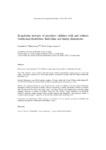Mostrar o rexistro simple do ítem
Ecuadorian mothers of preschool children with and without intellectual disabilities: Individual and family dimensions
| dc.contributor.author | Villavicencio Aguilar, Carmita | |
| dc.contributor.author | López-Larrosa, Silvia | |
| dc.date.accessioned | 2020-08-24T11:03:32Z | |
| dc.date.issued | 2020-10 | |
| dc.identifier.citation | Villavicencio CE, López-Larrosa S. Ecuadorian mothers of preschool children with and without intellectual disabilities: Individual and family dimensions. Res Dev Disabil. 2020 Oct;105:103735. | es_ES |
| dc.identifier.issn | 0891-4222 | |
| dc.identifier.uri | http://hdl.handle.net/2183/26150 | |
| dc.description.abstract | [Abstract] Background: Approximately 71,454 children younger than 5 years old have a disability in Ecuador. Aims: Our objective was to compare and relate family cohesion, adaptability, coping, perceived stress, and control with family satisfaction of Ecuadorian mothers of preschool children with and without intellectual disabilities (ID). Method: Participants were 384 Ecuadorian mothers: 111 had a child with ID and 273had a child without ID. The FACES II, Family Satisfaction Scale and Moos Coping Response Inventory were used. Results: No significant differences were found between mothers of children with and without intellectual disabilities on their perceptions of family cohesion, adaptability or family satisfaction. Mothers of children with ID perceived less stress and more control over their children and adopted more approach coping strategies compared to mothers of children without ID. The mothers ‘family satisfaction was positively related to approach coping strategies and to family cohesion and adaptability, and negatively related to avoidant coping strategies—regardless of whether their children had a disability or not. Conclusions and implications: These data are in accordance with an adaptive approach to disability and emphasise the capacity of individuals and families to cope. | es_ES |
| dc.description.sponsorship | Ecuador. Universidad Técnica de Machala; 489/2015 | es_ES |
| dc.language.iso | eng | es_ES |
| dc.publisher | Elsevier | es_ES |
| dc.relation.uri | https://doi.org/10.1016/j.ridd.2020.103735 | es_ES |
| dc.subject | Stress | es_ES |
| dc.subject | Cohesion | es_ES |
| dc.subject | Adaptability | es_ES |
| dc.subject | Family satisfaction | es_ES |
| dc.subject | Coping | es_ES |
| dc.subject | Intellectual disabilities | es_ES |
| dc.title | Ecuadorian mothers of preschool children with and without intellectual disabilities: Individual and family dimensions | es_ES |
| dc.type | info:eu-repo/semantics/article | es_ES |
| dc.rights.access | info:eu-repo/semantics/embargoedAccess | es_ES |
| dc.date.embargoEndDate | 2022-10-01 | es_ES |
| dc.date.embargoLift | 2022-10-01 | |
| UDC.journalTitle | Research in Developmental Disabilities | es_ES |
| UDC.issue | 105 | es_ES |
| UDC.startPage | 103735 | es_ES |
Ficheiros no ítem
Este ítem aparece na(s) seguinte(s) colección(s)
-
GI-IPRF - Artigos [152]






